Growing My “Lady Balls” in Chittagong, Bangladesh
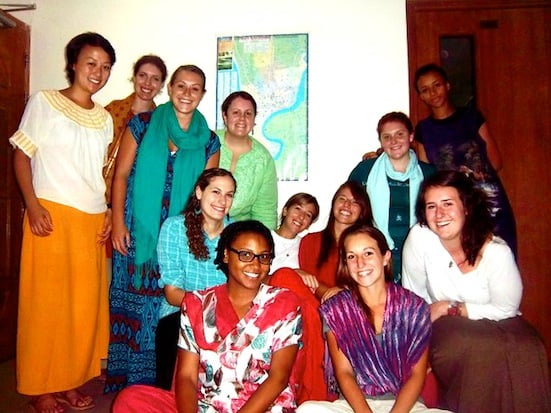
13 women. Traveling to teach for a year in Chittagong, Bangladesh, one of the most crowded places on the planet. With a year supply of tampons. And no promise of alcohol for the next 10 months. Yep, you guessed it. These women have what Emma Stone refers to in the film Easy A as “lady balls.” Or as I will refer to them, “huevos rancheros.” Now let me explain before you think this is some kind of crude joke.
I arrived in Chittagong about two weeks ago. I took a flight from Phoenix, Arizona to New York City, New York to Doha, Qatar to Dhaka, Bangladesh and finally here, to Chittagong, Bangladesh. Exhausted, jet-lagged and queasy from the combination of packaged airplane food and complimentary wine beverages served on the series of international flights, I was a swollen-foot mess walking off of that three-day long flight to the place I would be calling home for the next year. Feeling the wave of humidity and heat hit once we walked out of the baggage claim area, I thought to myself… wait, is this really happening? Like right now?
I admit that it was difficult not to communicate a mixture of awe, shock, and admiration of Chittagong in full bloom to everyone in the van.
But something about Bangladesh ignited a love for Eastern Asian culture I had suppressed after my visit to Chennai, India in February. As soon as we stepped out of the baggage claim area and greeted our field director and absolutely-amazing-ninja-driver-extraordinaire, I realized again how chaotic and beautiful this part of the world truly is. The subtropical climate, complete disregard for traffic or road rules, adherence to Islamic and Hindu practices, the mystery of ship breaking, and the handfuls of beautiful faces of Bangladeshi children, is something I had been dreaming about up until this point. And what I had envied about all those who traveled this road before me.
I want to paint you a picture of Chittagong, Bangladesh and our experience walking off that last leg of the flight. Now, first you must understand that Bangladesh is a coastal city and heavy on the rain, green councils, rice, and well…people. The 15 km we traveled from the Chittagong airport to our new ‘flats’ showcased the divide between rural and urban life in Bangladesh. In those 15 km, we watched what seemed like a flipbook of economic progression.
As soon as we stepped out of the baggage claim area and greeted our field director and absolutely-amazing-ninja-driver-extraordinaire, I realized again how chaotic and beautiful this part of the world truly is.
Starting from the city’s international airport, houses made of sheet metal, sticks, and wooden boards stood next to unmovable, brown cows, goats, and giant ships rocking in the Bay of Bengal. I watch, mesmerized by the tiny, wooden fishing boats men paddled as they came closer to thick ropes connecting these giant shipping boats to land. Women in multi-colored saris carried 3 by 4 foot bags and pots on their heads, and walked steadily along the road as we honked past. The most beautiful children in the world stood motionless, holding rocks or sticks as our van whizzed by. Men with orange-colored beards or hair, observing the Ramadan holiday, pedaled their bicycles slowly down the roads watching other men breaking down the ships.
Closer to the city, heavy smog and the all-too familiar cacophony of sirens, horns, bells, and shouts began to accumulate outside our tiny van. There were more traffic lanes here, but even less observance of traffic rules. It became clear that in any event, the bigger vehicle wins. Meaning…foot traffic takes last place.
Driving along, we recognized well-known American brands advertising their products here in the city. Companies such as Mobil, American Express, and Pepsi all had large advertisements amidst the hundreds of CNG (compressed natural gas vehicles) and auto rickshaw repair shops and fruit stands. Men on bicycles and CNGs pedal beside our van’s windows, staring at the ‘spectacle’ of crammed foreigners.
Growing My “Lady Balls” in Chittagong, Bangladesh.
I admit that it was difficult not to communicate a mixture of awe, shock, and admiration of Chittagong in full bloom to everyone in the van as well as those studying our facial expressions. We gawked at the lack of traffic rules, the dexterity to which our driver seemed to move in and out of traffic lanes and how men with legs smaller than our wrists were able to pedal a CNG with two people riding in passenger. The city felt alive, and I cannot wrap my head around the fact that I am finally in the heart of the country I had been imagining for the past five months.
After settling into our new flat, all of the volunteers head to a nearby Thai/Chinese/Indian food restaurant across the street. Which means we have to CROSS THE STREET. After surviving the first bout with Chittagong traffic by foot, we settle into our booths and order our first Bangladesh meal (which was delicious).
It is here, sitting in this booth, watching my fellow volunteers sip black tea and muse over flat nuances, jet lag, and the temperature change, that I realize we all are so very different. Yet, very similar in some regards. I cannot help but recall a greeting card my older brother sent me while I was in India last February. It was a cheesy orange sentiment with a tiger jumping through the center of the paper, claws and teeth bared. Inside the card, he wrote how he had recently watched this movie called Easy A (which I highly recommend for a good laugh), in which the main character refers to having “lady balls”–which he thought I had acquired by traveling to India.
I can’t help but think that all of these women, who have left behind family, friends, pets, apartments, steady jobs with health benefits, boyfriends, internships, weekend trips to Vegas, graduate school, and the comfort of American life, have some “lady balls.”
Not sure whether he intended it as a compliment or a stab. It is difficult to tell when it is coming from your older brother, but I took it as praise. However, when I received the card I did not believe the phrase particularly pertained to me. Sitting at our booth, I have a flashback to that card (and the cheesy tiger), and I can’t help but think that all of these women, who have left behind family, friends, pets, apartments, steady jobs with health benefits, boyfriends, internships, weekend trips to Vegas, graduate school, and the comfort of American life, have some “huevos rancheros.”
I blurt out what I have been musing over in my head, the compliment-this-could-also-be-taken-wrong-comment “lady ball” slips onto the table. I immediately cover my mouth and we all hope that our conservative, Bangladeshi server has not heard nor understood my phrase. It’s not a perfect description of what brought us all to this country to work at the Asian University for Women, but I think for now it will suffice.
Growing My “Lady Balls” in Chittagong Bangladesh photo credit by Lauren.


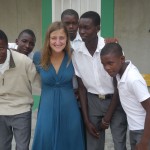

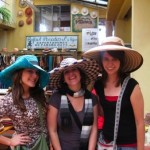
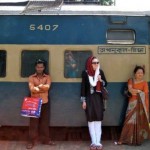


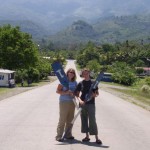
Well written summary of Chittagong. Keep up the good work
LOVED reading it so much that posted it on my FB. Do you have a blog you’ll be writing while you’re in B?
Thank you so much Natasha! I am happy that you enjoyed the piece. I have a blog where you can read more about my travels in Bangladesh. Feel free to follow the link: http://thedailybang.wordpress.com/
Thanks again for the kind words!
~Lauren
So interesting! I enjoy your writing style so much.
Thank you very much!
Great article! Very well written. You sure painted a picture for me. 🙂